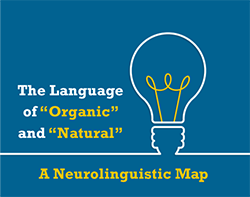Word Play: Discovering Distinctions in Food & Beverage Culture
 The Brief
The Brief
Organic or Natural. Artisan or Handcrafted. Health or Wellness. Understanding that language and cultural values are deeply intertwined and ultimately define who we are and how we relate to each other is the basis of our analysis of conversations with consumers. Although our research is conducted throughout the United States primarily among English-speaking consumers, not every speaker of the English language will talk the same way. Rather, there are individual and social variations that make it possible to segment and typify consumers through a linguistic filter. Uncovering the nuanced differences in what consumers mean when they use words and phrases to describe their feelings about any given topic within the culture of food and beverage is at the heart of our neurolinguistic analysis capabilities.
Conversations with consumers
Why is it important to analyze language and uncover relationship values among consumers? Simply, the meanings consumers apply to personal relationships can be translated to meanings consumers apply to choosing a product, service or brand. In other words, when choosing a brand, for instance, many consumers talk about the importance of an “honest” brand, a company with “integrity” or advertising campaigns that are “intelligent” and “creative.”
These socially shared meanings (use of language) and practices link consumers, making them feel as if they are part of an extended relationship or community.
Why words matter
When people think of language, they often tend to think about words and phrases arranged in a particular order to convey meaning. In theory, if one has a dictionary and a cursory understanding of grammar, one should be able to communicate.
Not necessarily.
Think about where you work, for example, and the culture of where you work. Even within your organization, there may be different meanings and misconceptions about what a particular concept, lifestyle, experience or brand means. There could be people in the same department, seemingly talking about the same thing, but actually meaning something entirely different.
Language is wild, free and roaming. That’s why we find the study of what consumers say so darn fascinating. Understanding the meanings and relationships that are being communicated behind specific words and phrases is a step in the right direction towards developing effective marketing messaging and communications.
Cautionary tales: when loss of distinction leads to diluted meaning
The many faces of “organic”
Consumer understanding of “organic” has evolved over the years. Twenty years ago, we found that many consumers had little if any knowledge about it, while at the same time they had some sense of the idea of organic. We know that the true meaning of organic is more complex than most consumers are aware.
Our research has revealed that as consumer involvement with organic has grown, we encounter an ever-expanding body of interpretations, understanding and practice around the notion of “organic.” Hartman Group CEO Laurie Demeritt recalls explaining to companies even as few as five or six years ago that consumers see organic as more about health than the environment. “They’d put pictures of the earth on products,” she said. “They assumed people wanted to save the world, but we saw the issue as moms wanting to feed their families better food.”
Organic remains a resonant symbol of food quality (a sort of shorthand for higher-quality food), particularly as it pertains to food being grown naturally. Today, organic products still signal “better” to even the most skeptical consumers. The heart of the meaning of organic lies in more natural growing methods, which consumers broadly understand to be legally regulated (unlike many other claims). However, organic products also retain the halo of being foods made with more care and in greater alignment with their values.
Today, there is considerable consternation among consumers when they encounter the terms “organic” and “natural.” They are two terms that have come to mean so many things to consumers that they now represent no one thing for everyone. Their meanings have become diluted to the point that when consumers encounter the terms, some approach them with a bit of skepticism. Are they the real deal or is it a marketing gimmick?
When the label says “artisan”
The term “artisan” is a prime example of how a term can be co-opted by the food industry and marketing to the point now that its distinction has been diluted. Over the last few years, we have been tracking the increasing popularity in use of artisan on food labels ranging from supermarket bread to mass-produced frozen meals. Short lesson here: artisan is not a label (are you paying attention, “craft"?).
The authentic meaning and application of artisan alludes to a simpler time when people took pride in their craft: it’s about special and unique. Today, the draw for real artisan products is born out of a movement deriding overly processed, mass-produced foods linked to big corporations. Manufacturers, attempting to ride the wave of this movement by stamping artisan on their products, are hoping it will suggest that what’s inside is higher quality — even premium.
Artisan is a quality dimension, implying that the narrative has deeper meaning beyond slapping a label on the package. It is an authentic narrative about the ingredients and the special process used to create the product. It’s a story of culture (how it’s made) and nature (what it’s made of).
Cultural Pulse
Cultures are shifting, languages are shifting…the world is not a static place. The point is that it is very difficult to be relevant and connect with each other if we do not understand meanings of words and thought processes. It is especially difficult because language continually evolves as do consumers and how they lead their lives. Keeping up with language will keep communications current and relevant to their lifestyles, social situations and cultural contexts.
If you want to understand how consumers talk about your brands, let’s have a conversation. Contact: melissa@hartman-group.com

